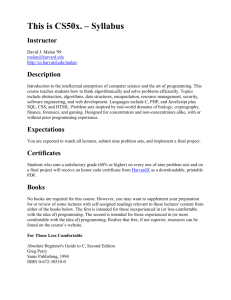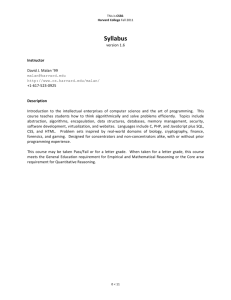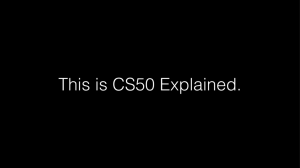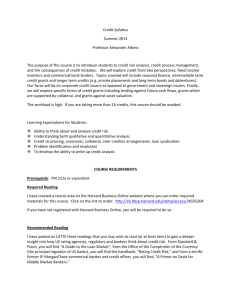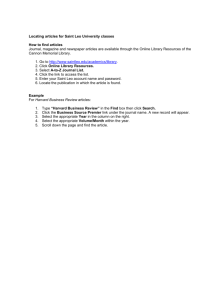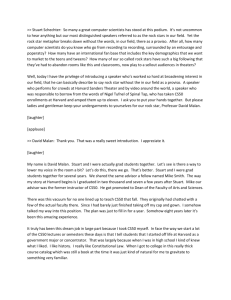Syllabus - Harvard's CS50
advertisement
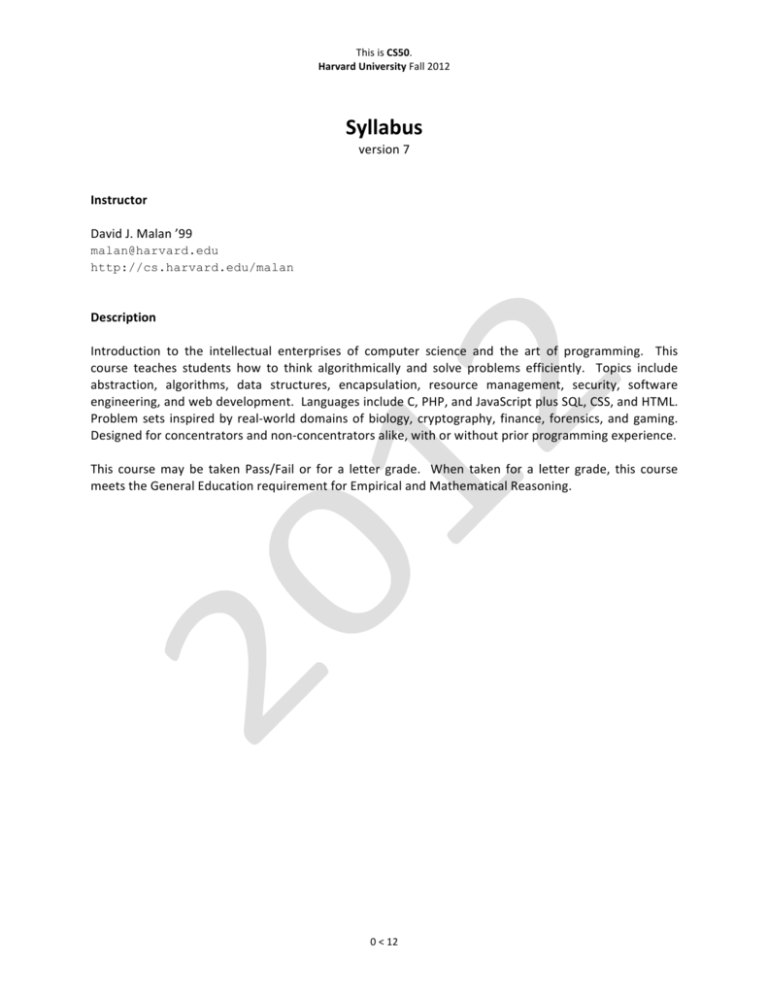
This is CS50. Harvard University Fall 2012 Syllabus version 7 Instructor David J. Malan ’99 malan@harvard.edu http://cs.harvard.edu/malan Description Introduction to the intellectual enterprises of computer science and the art of programming. This course teaches students how to think algorithmically and solve problems efficiently. Topics include abstraction, algorithms, data structures, encapsulation, resource management, security, software engineering, and web development. Languages include C, PHP, and JavaScript plus SQL, CSS, and HTML. Problem sets inspired by real-­‐world domains of biology, cryptography, finance, forensics, and gaming. Designed for concentrators and non-­‐concentrators alike, with or without prior programming experience. This course may be taken Pass/Fail or for a letter grade. When taken for a letter grade, this course meets the General Education requirement for Empirical and Mathematical Reasoning. 0 < 12 This is CS50. Harvard University Fall 2012 Expectations You are expected to attend or watch all lectures and sections, submit eight problem sets, take two quizzes, and submit a final project. Grades This course may be taken Pass/Fail or for a letter grade. You may change from Pass/Fail to a letter grade or vice versa up until the fifth Monday of the term, per the Handbook for Students. The grade of Pass represents letter grades of A to D–. All students, whether taking the course Pass/Fail or for a letter grade, must ordinarily submit all eight problem sets, take both quizzes, and submit a final project in order to be eligible for a passing grade (i.e., Pass or A to D–) unless granted an exception in writing by the course's instructor or preceptor. Realize that some concentrations (e.g., Applied Mathematics, Computer Science, Engineering Sciences, et al.) do not allow courses taken Pass/Fail to satisfy concentration requirements. Nor do courses taken Pass/Fail satisfy General Education requirements. Take care to register for a letter grade or to change from Pass/Fail to a letter grade by the fifth Monday of the term if you must do so to meet some requirement. Final grades are determined primarily using the following weights: Problem Sets: 50% Quizzes: 40% Final Project: 10% Problem sets and the final project are evaluated primarily along axes of scope, correctness, design, and style, with grades ordinarily determined by scope × (3 × correctness + 2 × design + 1 × style). Scores are normalized across TFs at term's end, so mid-­‐semester comparisons among students of scores are not reliable indicators of standing. Although you must submit all eight problem sets, your lowest score among those problem sets on which you received perfect scores for the axis of scope will be dropped when final grades are determined. Know that CS50 draws quite the spectrum of students, including "those less comfortable," "those more comfortable," and those somewhere in between. However, what ultimately matters in this course is not so much where you end up relative to your classmates but where you, in Week 11, end up relative to yourself in Week 0. The course is not graded on a curve. The course does not have pre-­‐determined cutoffs for final grades. Those less comfortable and somewhere in between are not at a disadvantage vis-­‐à-­‐vis those more comfortable. Each student's final grade is individually determined at term's end after input from the teaching fellows. Remarkable effort and upward trending do not go unnoticed. 1 < 12 This is CS50. Harvard University Fall 2012 Books No books are required for this course. However, you may want to supplement your preparation for or review of some lectures with self-­‐assigned readings relevant to those lectures' content from either of the books below. The first is intended for those inexperienced in (or less comfortable with the idea of) programming. The second is intended for those experienced in (or more comfortable with the idea of) programming. Both are available online for free via PIN authentication.* Both are available for purchase at the Coop and at sites like Amazon.com. Both have been placed on reserve at Cabot Science Library. Realize that free, if not superior, resources can be found on the course's website. For Those Less Comfortable Absolute Beginner's Guide to C, Second Edition Greg Perry Sams Publishing, 1994 http://nrs.harvard.edu/urn-3:hul.ebookbatch.SAFAR_batch:9780131388185 ISBN 0-­‐672-­‐30510-­‐0 For Those More Comfortable Programming in C, Third Edition Stephen Kochan Sams Publishing, 2004 http://nrs.harvard.edu/urn-3:hul.ebookbatch.SAFAR_batch:9780768689068 ISBN 0-­‐672-­‐32666-­‐3 The book below is recommended for those interested in understanding how their own computers work for personal edification. It is not available online for free via PIN. But it is available for purchase at the Coop and at sites like Amazon.com. And it, too, has been placed on reserve. How Computers Work, Ninth Edition Ron White Que Publishing, 2007 ISBN 0-­‐7897-­‐3613-­‐6 This last book below is recommended for aspiring hackers, those interested in programming tricks and low-­‐level optimization of code for applications beyond the scope of this course. It is available online for free via PIN authentication.* It is also available for purchase at the Coop and at sites like Amazon.com. And it, too, has been placed on reserve. Hacker's Delight Henry S. Warren Jr. Addison-­‐Wesley, 2003 http://nrs.harvard.edu/urn-3:hul.ebookbatch.SAFAR_batch:0201914654 ISBN 0-­‐201-­‐91465-­‐4 * Just realize that Harvard only has a few concurrent licenses, so only a few students can access a book at the same time. 2 < 12 This is CS50. Harvard University Fall 2012 Website The address of this course's website is: https://www.cs50.net/ Visit the course's website to watch videos, to get help, to download handouts and software, and to follow links to other resources. Lectures Lectures ordinarily take place in Sanders Theatre on Mondays and Wednesdays from 1:00pm until 2:30pm.† Each lecture is filmed and made available within 24 hours in streaming and downloadable formats (MP3 and MP4). Once posted, these recordings remain available until semester's end. You are welcome to watch or listen to a recording if you are unable to attend some lecture in person. You are encouraged to watch or listen to these recordings for the sake of review. A schedule of lectures, subject to change, appears below. Week 0 Wed 9/5, Fri 9/7 Introduction. Bits. Binary. ASCII. Programming. Algorithms. Statements. Boolean expressions. Conditions. Loops. Variables. Threads. Events. Week 1 Mon 9/10, Wed 9/12 C. Source code. Compilers. Object code. Functions. Comments. Standard output. Arithmetic operators. Precedence. Local variables. Types. Casting. Standard input. Libraries. Boolean expressions, continued. Conditions, continued. Loops, continued. Week 2 Mon 9/17, Wed 9/19 Functions, continued. Global variables. Parameters. Return values. Stack. Frames. Scope. Arrays. Strings. Command-­‐line arguments. Cryptography. † This course will also meet on Fri 9/7 and Fri 10/12. Students with conflicts may watch those lectures online. 3 < 12 This is CS50. Harvard University Fall 2012 Week 3 Mon 9/24, Wed 9/26 Linear search. Binary search. Asymptotic notation. Bubble sort. Selection sort. Merge sort. Week 4 Mon 10/1, Wed 10/3 Recursion. Debugging. File I/O. Structures. Pointers. Dynamic memory allocation. Heap. Week 5 Wed 10/10, Fri 10/12 Quiz 0 on Wed 10/10. CS50 Library. Pointers, continued. Forensics. Week 6 Mon 10/15, Wed 10/17 File I/O. Linked lists. Stacks. Queues. Hash tables. Trees. Binary search trees. Tries. Week 7 Mon 10/22, Wed 10/24 Huffman coding. Bitwise operators. HTTP. HTML. Week 8 Mon 10/29, Wed 10/31 CSS. PHP. SQL. Week 9 Mon 11/5, Wed 11/7 SQL, continued. JavaScript. Ajax. Design. Week 10 Mon 11/12, Wed 11/14 Security. Quiz 1 on Wed 11/14. Week 11 Mon 11/19 Life after 50. 4 < 12 This is CS50. Harvard University Fall 2012 Sections Lectures are supplemented by weekly, 90-­‐minute sections led by the teaching fellows. Sections provide you with opportunities to explore the course's material in a more intimate environment, with only your teaching fellow and a handful of classmates present, as well as to dive into hands-­‐on activities. Different sections are offered for those less comfortable, those more comfortable, and those somewhere in between. Sectioning begins in Week 0. Sections themselves begin in Week 2. A schedule of sections appears on the course's website. Walkthroughs On Fridays from 2:30pm until 4:00pm, the teaching fellows hold a "walkthrough" for the upcoming week's problem set during which you receive direction on where to begin and how to approach the week's challenges. Each walkthrough is filmed and made available within 24 hours in streaming and downloadable formats (MP3 and MP4). You are expected to attend or watch walkthroughs before asking questions about problem sets at office hours or via cs50.net/discuss. Office Hours Office hours are opportunities for assistance with problem sets alongside the course's teaching fellows and course assistants. Office hours ordinarily take place on Mondays, Tuesdays, Wednesdays, and Thursdays, from 8pm until 11pm, in Annenberg Hall. Also in attendance are free food and drinks. Upon arrival, log into cs50.net/discuss. Before posting a question, be sure to search, lest it already have been asked and answered. If you do post a new question, provide as much detail as possible. We'll do our best to reply quickly. If your question cannot be answered effectively online, it will be routed (upon confirmation from you) to the CS50 Greeter, an iPad-­‐equipped staff member who will refer you to a teaching fellow or course assistant seated in the vicinity. 5 < 12 This is CS50. Harvard University Fall 2012 Problem Sets Eight problem sets are assigned during the semester. Each is due via electronic submission six or more days after its date of distribution. However, you have five (5) "late days" that you may "spend" during the semester, each of which provides you with an extension of twenty-­‐four hours. You may spend no more than one late day on any particular problem set. You need not inform the staff of your use of a late day; usage of late days is tracked automatically. Lateness of electronic submissions is determined down to the minute by submissions' timestamps. Submitting more than seven minutes late is equivalent to submitting twenty-­‐four hours late. Late work is not accepted once you have exhausted your late days, except in cases of emergency. Technical difficulties are not considered emergencies. These late days cannot be spent on the course's final project. In order to accommodate students with different backgrounds, some problem sets are released in two editions: a standard edition intended for most students and a "Hacker Edition" intended for some students. Both editions essentially cover the same material. But the Hacker Edition typically presents that material from a more technical angle and poses more sophisticated questions. Hacker Editions are graded separately from standard editions, but those students who submit the former do not receive any form of extra credit outright. When determining grades at term's end, however, we do bear in mind submissions of Hacker Editions. To be clear, we encourage most students (including aspiring computer scientists) to tackle the standard editions. However, you may choose, week to week, which edition to submit. You may not submit both or some amalgam of the two. Although you must submit all eight problem sets, your lowest score among those problem sets on which you received a perfect score for the axis of scope will be dropped when final grades are determined. A schedule of problem sets, subject to change, appears below. Problem Set 0: Scratch due by noon on Thu 9/13 Problem Set 1: C due by noon on Thu 9/20 Problem Set 2: Crypto due by noon on Thu 9/27 Problem Set 3: Scramble due by noon on Thu 10/4 Problem Set 4: Forensics due by noon on Thu 10/18 Problem Set 5: Mispellings due by noon on Thu 10/25 6 < 12 This is CS50. Harvard University Fall 2012 Problem Set 6: Huff'n Puff due by noon on Thu 11/1 Problem Set 7: C$50 Finance due by noon on Thu 11/8 Quizzes The course has two 75-­‐minute quizzes. These quizzes are "closed-­‐book," but you may utilize during each quiz one two-­‐sided page (8.5" × 11") of notes, typed or written, and a pen or pencil, nothing else. When final grades are computed, your scores on these two quizzes are weighted equally. A schedule of quizzes, subject to change, appears below; these quizzes take place in lieu of lectures on these dates. Quiz 0 Wed 10/10 Covers weeks 0 through 4. Quiz 1 Wed 11/14 Covers weeks 0 through 10 with emphasis on 5 onward. Unless arranged with the course's heads in advance, quizzes may not be taken at alternative times even if missed by accident, except in cases of emergency. Final Project The climax of this course is its final project. The final project is your opportunity to take your newfound savvy with programming out for a spin and develop your very own piece of software. So long as your project draws upon this course's lessons, the nature of your project is entirely up to you, albeit subject to the staff's approval. You may implement your project in any language(s) as long as the staff approves. You are welcome to utilize infrastructure other than the CS50 Appliance, provided the staff ultimately has access to any hardware and software that your project requires. All that we ask is that you build something of interest to you, that you solve an actual problem, that you impact campus, or that you change the world. Strive to create something that outlives this course. Inasmuch as software development is rarely a one-­‐person effort, you are allowed an opportunity to collaborate with one or two classmates for this final project. Needless to say, it is expected that every student in any such group contribute equally to the design and implementation of that group's project. Moreover, it is expected that the scope of a two-­‐ or three-­‐person group's project be, respectively, twice 7 < 12 This is CS50. Harvard University Fall 2012 or thrice that of a typical one-­‐person project. A one-­‐person project, mind you, should entail more time and effort than is required by each of the course's problem sets. Although no more than three students may design and implement a given project, you are welcome to solicit advice from others, so long as you respect the course's policy on academic honesty. Guidelines for the final project will be distributed by Mon 10/22. A schedule, subject to change, appears below. Pre-­‐Proposal due by noon on Mon 11/5 Proposal due by noon on Mon 11/12 Status Report due by noon on Fri 11/30 CS50 Hackathon from 8:00pm on Wed 12/5 until 7:00am on Thu 12/6 Implementation due by noon on Sun 12/9 CS50 Fair from 11:00am until 4:30pm on Mon 12/10 Extensions on the final project are not granted, except in cases of emergency. Technical difficulties are not considered emergencies. Problem sets' late days cannot be spent on the final project. Lateness of submissions is determined down to the minute by submissions' timestamps. Submitting more than seven minutes late is equivalent to not submitting at all. CS50 Hackathon From 8:00pm on Wed 12/5 until 7:00am on Thu 12/6 is the CS50 Hackathon, an epic all-­‐nighter during which you can dive into your final project's implementation alongside classmates and staff. If you choose to partake, you'll be asked to propose three milestones for yourself that evening: a "good" one that you intend to achieve no matter what; a "better" one that you think you can achieve; and a "best" one that you hope to achieve. Dinner will be served at 9:00pm, second dinner will be served at 1:00am, and those still standing at 5:00am will be treated to breakfast at IHOP. 8 < 12 This is CS50. Harvard University Fall 2012 CS50 Fair From 11:00am until 4:30pm on Mon 12/10 is the CS50 Fair, an epic display of final projects. Not only is the fair a venue at which to see classmates' projects and demo your own, it is an opportunity to mingle with students, faculty, and staff from across campus as well as recruiters from industry. Attendance is expected of all students. Also in attendance are popcorn, candy, and a raffle with (fabulous) prizes. Family and friends are welcome to join. Academic Honesty All work that you do toward fulfillment of this course's expectations must be your own unless collaboration is explicitly allowed in writing by the course's instructor. Collaboration in the completion of problem sets is not permitted unless otherwise stated by some problem set's specification. Viewing or copying another individual's work (even if left by a printer, stored in an executable directory, or posted online) or lifting material from a book, website, or other source—even in part—and presenting it as your own constitutes academic dishonesty, as does showing or giving your work, even in part, to another student or soliciting the work of another individual. Similarly is dual submission academic dishonesty: you may not submit the same or similar work to this course that you have submitted or will submit to another. Nor may you provide or make available solutions to problem sets to individuals who take or may take this course in the future. Moreover, submission of any work that you intend to use outside of the course (e.g., for a job) must be approved by the course's instructor or preceptor. You are welcome to discuss the course's material with others in order to better understand it. You may even discuss problem sets with classmates, but you may not share code. In other words, you may communicate with classmates in English, but you may not communicate in, say, C. If in doubt as to the appropriateness of some discussion, contact the course's instructor or preceptor. You may turn to the Web for instruction beyond the course's lectures and sections, for references, and for solutions to technical difficulties, but not for outright solutions to problems on problem sets or your own final project. However, failure to cite (as with comments) the origin of any code or technique that you do discover outside of the course's lectures and sections (even while respecting these constraints) and then integrate into your own work may be considered academic dishonesty. All forms of academic dishonesty are dealt with harshly. If the course refers some matter to the Administrative Board and the outcome for some student is Admonish, Probation, Requirement to Withdraw, or Recommendation to Dismiss, the course reserves the right to impose local sanctions on top of that outcome for that student that may include, but not be limited to, a failing grade for work submitted or for the course itself. 9 < 12 This is CS50. Harvard University Fall 2012 Acknowledgement and Authorization Harvard plans to make, and to permit a third party documentary filmmaker (the "Filmmaker") to make, video and audio recordings of Computer Science 50 (CS50) lectures, sections, office hours, walkthroughs, seminars, and other events and activities related to CS50, with the aims of making the content of the course more widely available and contributing to public understanding of innovative learning (the "Projects"). The recordings, or edited versions of them, may be made available to other Harvard students, to students at other educational institutions, and to the broader public via edX, the Internet, television, theatrical distribution, DVD, or other means. It is also possible that the recordings may be used to make other derivative works in the future. By agreement with Harvard, the Filmmaker's use of recordings it makes will be limited to use in a documentary film about innovative learning (the "Film"). Students may elect not to appear in video used in the Projects and may still participate fully in CS50. When you submit Problem Set 0, you will need to sign online an Acknowledgement and Authorization in the following form: I understand that, if I do not wish any video footage of me to be used as part of the Projects, I should so inform the course's instructor by emailing recordings@cs50.net within one week of enrolling in CS50. In that event, I understand that I should sit in the designated "no film" section of CS50 classrooms and should not walk in the field of view of the cameras. I understand that Harvard and the Filmmaker will take reasonable steps, with my cooperation, to avoid including identifiable images of me in Project video shot in classrooms and other course locations after I opt out as just described. I understand that I am free to opt out of the Project videos in this way, and that doing so will not affect my grade or my ability to participate in course activities. Unless I opt out of the Project videos as described above and take the steps that will be outlined by the instructor to avoid being filmed, I authorize Harvard and the Filmmaker each to make and use video and audio recordings of my participation in CS50 and activities related to CS50 (the "Recordings"). I understand and agree that the Recordings may include my image, voice and name. I also understand and agree that, even if I opt out of the Project videos, my voice and spoken name may be picked up by microphones outside the "no film" section and may be included in the Recordings. I understand and agree that Harvard and the Filmmaker each will have the irrevocable, worldwide right to make, edit, modify, copy, publish, transmit, distribute, sell, publicly display, publicly perform, and otherwise use and make available their respective Recordings and any other works that may be derived from those Recordings, in any manner or medium now known or later invented, and to authorize others to do so as well, provided that the Filmmaker's use of Recordings it makes will be limited to use in the Film. I hereby transfer to Harvard any rights, including copyrights, I may have in the Recordings Harvard makes; and I hereby transfer to the Filmmaker for use in the Film any rights, including copyrights, I may have in the Recordings the Filmmaker makes. I will remain free to use and disseminate any ideas, remarks, or other material that I may contribute to course discussions. I acknowledge and agree that I will not be entitled to any payment, now or in the future, in connection with the Recordings or any works derived from them. This Acknowledgment and Authorization is a 10 < 12 This is CS50. Harvard University Fall 2012 binding agreement, and is signed as a document under seal governed by the laws of the Commonwealth of Massachusetts. Unless you opt out as described in the Acknowledgment and Authorization, you are agreeing, by attending CS50, that your participation in CS50 and related activities may be filmed and used by Harvard and the Filmmaker in connection with the video projects without further obligation or liability to you, even if you do not sign any authorization. If you have any questions about the above, contact recordings@cs50.net. 11 < 12
